Posted by Elena del Valle on March 18, 2011
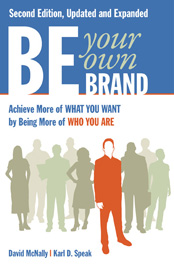
Be Your Own Brand book cover
Photos: Berrett-Koehler Publishers, Inc.
David McNally, a film producer and author, and Karl D. Speak, a brand building consultant and author believe everyone has a personal brand. They think of it as the way that other people perceive who a person is and what he or she stands for. Building a personal brand, they say, is about understanding who someone is and wants to be, and identifying the right way to share that impression with others in a genuine way.
The best way to do that, according to them, is to “make a positive difference in the lives of others.” In 2002 they published the first edition of Be Your Own Brand, a book about personal branding. In Be Your Own Brand Achieve More of What You Want by Being More of Who You Are Second Edition (Berret-Koehler Publishers, $19.95) published this year, they share their original ideas on personal brand building and expand on the changes that have taken place since they published the first edition.
They are convinced that the concept of a personal brand has become more accepted in the business environment; and that social media is playing a role in facilitating the development of personal brands. The idea behind a personal brand is to create a brand that is distinctive, of interest to others and “consistent in the way it is perceived and presented,” they say.

Karl Speak
According to the authors, someone with a strong personal brand uses his or her qualities to make a difference in other people’s lives. The 143-page softcover book is divided into ten chapters and three main sections: Personal Brand Basics, Designing Your Personal Brand of Making a Difference, and Using the Power of Alignment to Build a Strong Personal Brand.
McNally’s books and films have been translated to twelve languages and been available in twenty countries. Speak founded Brand Tool Box Ltd., an internal branding company, in 1984.
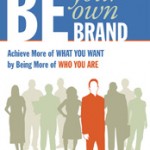
Click to buy Be Your Own Brand
Comments:
Filed Under: Books
Posted by Elena del Valle on March 11, 2011
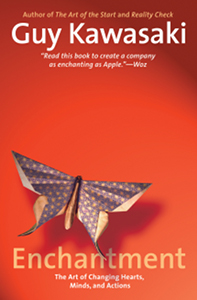
Enchantment book cover
Photos: Guy Kawasaki
Why do people of all ages stand in line and wait with anticipation to purchase new Apple products like the iPhone, iPod, iPad? Then, a few months later return to buy the newest version of the same product? Why did mobile services provider T-Mobile recently loose more than 300,000 customers many of which are thought to have become AT&T and Verizon customers to get their hands on the iPhone? Guy Kawasaki, a former Apple executive, believes it is the result of something he calls Enchantment.
This month, he explains what he believes makes people, brands and products desirable in Enchantment The Art of Changing Hearts, Minds, and Actions (Portfolio/Penguin Group, $26.95), his new 211-page hardcover book. He believes this quality of Enchantment transforms relationships and situations, converts hostility into civility and civility into affinity, converting skeptics into believers without manipulation.
He proposes an attitude that drives voluntary, lasting and happy (he calls it delightful) change in others by focusing on people’s wants, being likable and trustworthy and representing a worthy cause. At the end of each chapter, he showcases an example written by a guest contributor to illustrate the point he wrote about in that chapter.
The book, peppered with how-to tips, is divided into an Introduction and Conclusion as twelve other chapters: Why Enchantment?, How to Achieve Likability, How to Achieve Trustworthiness, How to Prepare, How to Launch, How to Overcome Resistance, How to Make Enchantment Endure, How to Use Push Technology, How to Use Pull Technology, How to Enchant Your Employees, How to Enchant Your Boss, and How to Resist Enchantment.
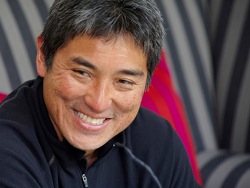
Guy Kawasaki, author, Enchantment
He urges those who enchant to do so responsibly so that their skills benefit all involved. To make Enchantment last he thinks it is necessary to present an idea that other can internalize allowing them to reciprocate and fulfill their commitment. He also suggests relying on a network of supporters among developers, consultants and cause friendly people.
Kawasaki, the author of nine previous books, is co-founder of Alltop and founding partner at Garage Technology Ventures.

Click to buy Enchantment
Comments:
Filed Under: Books
Posted by Elena del Valle on March 9, 2011
By Patria de Lancer Julnes, Ph.D.

Patria de Lancer Julnes, Ph.D.
According to 2009 census estimates Hispanics1 comprise the largest minority group among, 15.8% or 48.4 million people and expected to continue growing. In spite of the size and rapid growth of the Hispanic population, for a long time Hispanics have been considered a sleeping giant, a label that, according to Cristina Beltran (2010), evokes the notion that Hispanics are “subjects on the cusp of political power and influence” (p. 3), but also a group who is “politically passive and difficult to mobilize: the giant who cannot be roused from its slumber” (p.4).
However, in a recent book, journalist Jorge Ramos (2005) challenges the image of Hispanics as a sleeping giant, arguing that Hispanics not only are now able to decide closely contested electoral races, but also that because of their size, important decisions will require the support of Hispanics. Ramos predicts that the “Hispanic vote will cease to be a weightless player on the political scale, and instead become the veritable ‘big boy’ in states and regions where the Latino vote has historically congregated” (p. xviii).The results of the 2010 midterm election, when for the first time three Hispanic candidates won top state level posts, seem to confirm Ramo’s predictions.
Click here to read To awake sleeping giants, invite them to play for real
Posted by Elena del Valle on March 8, 2011
Information provided by Event Partner
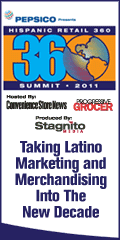
2011 Hispanic Retail 360 Summit
Taking Latino Marketing and Merchandising into the New Decade
August 10-12, 2011
Hilton La Jolla Torrey Pines, La Jolla, CA
Hispanic MPR subscribers qualify for a special low registration rate of only $599 for this seventh annual Hispanic Retail 360 Summit.
This is the premier event for retailers and marketers who want to grow their business with the U.S. Hispanic consumer market. It is a high-level conference and tabletop exhibition including informative sessions and opportunities for face-to-face interaction between retailers, suppliers and experts in Hispanic marketing.
The conference provides a 360 degree look at the Hispanic shopper, using data from several authoritative research companies, retailer case studies, and noted experts on demographics, buying behavior, segmentation, marketing, merchandising, product sourcing, store design and in-store marketing to Hispanic consumers. Keynote speaker is Vicente Fox, President of Mexico 2000-2006, one of the world’s most important voices on the contemporary geo-political landscape and the role of business in the developing world.
Details and registration are at www.hispanicretail360.com. Hispanic MPR subscribers should enter the Promo Code “HISMPR” for the special $599 rate. For sponsorship opportunities contact Michael Hatherill, 201-855-7610, mhatherill@stagnitomedia.com.
Posted by Elena del Valle on March 7, 2011
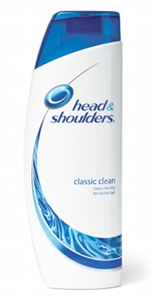
Twenty-two percent of survey respondents picked Head and Shoulders Shampoo as their favorite
Photo: Procter and Gamble
A 2010 Mintel survey of Hispanic personal care product attitudes and shopping habits indicates Latinos are brand loyal to their shampoo and conditioner across household income levels. In spite of the economic slow down, 60 percent of respondents to the survey said they buy the same brand of shampoo and conditioner. This was especially true for Spanish dominant shoppers.
Hispanics also favored styling products. Forty-six percent of survey participants said they buy styling gels and lotions, a greater percentage than Asians, Blacks and Whites.
More Hispanics, 57 percent, said they rely on conditioners to soften and detangle their hair than Whites, 49 percent. Many respondents in the Latino and Asian market segments, 24 percent, like to color their hair compared to only 18 percent of Whites and 20 percent of Blacks.
The top three shampoo brands among Latinos who participated in the survey were Head and Shoulders (preferred by almost one quarter of these survey takers) followed by Pantene and Suave.
English dominant Latino respondents didn’t respond well when it came to hairspray: 46 percent of English-dominant Hispanics said that they do not buy hairspray in comparison with 24 percent of Spanish dominant respondents.
Mintel is an international research company. This Mintel survey was conducted online in August 2010 among 534 U.S. Hispanic respondents aged 18 and older.
Posted by Elena del Valle on March 4, 2011
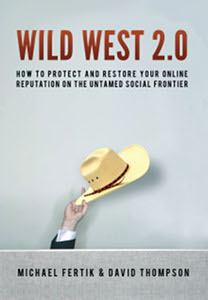
Wild West 2.0 book cover
Photos: AMACOM
Attorneys Michael Fertik of Redwood City and David Thompson of Los Angeles, California believe the internet is a new world where many of the rules we know and abide by do not apply. Convinced that the online world is a kind of Wild West, they named their recently released book Wild West 2.0 How to protect and restore your online reputation on the untamed social frontier (AMACOM, $24,95).
Both used to work for ReputationDefender. In January 2011, a company name change to Reputation.com was announced. After the book was published Thompson moved on to a law firm. It took the attorneys several years to conduct the research for the book and one year to write it. In the book, they assert that because search engines do not rank results based on the veracity of the information baseless attacks may spread in the digital world without checks of any kind.
Thompson explained by phone that since the book was published “it is becoming even more important to be aware of online reputation issues;” that Google still dominates the market and constantly changes its natural results formula without revealing, except for a very broad outline, the selection criteria. A customer whose privacy is violated or whose reputation is wrongly described online may go out of business, he explained when asked about the business consequences and importance of reputation management.
The authors offer “proven strategies for building a storm proof reputation.” In the book, they explain the parallels they see between the lawless frontier in the Old West and today’s internet; share stories of anonymous attacks; discuss sites that share private data; make suggestions for readers to locate online mentions about them and their businesses online; outline strategies to respond to baseless information with truthful content; and address methods for reputation repair and protection.

Co-author Michael Fartik
The 264-page hardcover book published in 2010 is divided into 14 chapters: Welcome to the New Digital Frontier; Your Online Reputation is Your Reputation; The Internet is the New Wild West; The Forces Driving Online Reputation; Anonymous Cowards; Google Gone Wild: The Digital Threat to Reputation; Why People Attack Each Other Online; Types of Internet Attacks; How to Measure Damage to Your Internet Reputation; Your Reputation Road Map and Online Reputation Audit; Getting Proactive: The Best Defense is a Good Offense; Recovering from Online Smears: Restoring Your Reputation After the Damage Has Been Done; Protect Your Small Business and Your Professional Reputation; and Conclusion: Embrace the Internet.

Co-author David Thompson
According to a Reputation.com spokesperson, the book hit some “great milestones on Amazon” such as the number one place in the Public Relations and Computers and Internet categories; second place in Marketing and Sales; third place in Business and Management; twelfth place in Hot New Releases, and twenty-second place overall. Fertik is the founder and chief executive officer of Reputation.com (formerly ReputationDefender). He serves on the advisory board of the Internet Keep Safe Coalition.
Thompson was general counsel and chief privacy officer of Reputation.com at the time the book was written. He is now an attorney with Munger Tolles and Olson LLP where he is developing the firm’s reputation management practice.
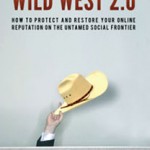
Click to buy Wild West 2.0
Comments:
Filed Under: Books
Posted by Elena del Valle on March 3, 2011
Information provided by Event Partner
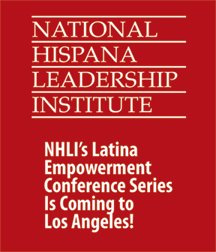
Latina Empowerment Conference
Los Angeles, CA
March 18, 2011
The National Hispana Leadership Institute, the nation’s premier organization for Latinas, is bringing its renowned must-attend Latina Empowerment Conference series to Los Angeles, CA on Friday, March 18 at the Wilshire Grand Hotel, 930 Wilshire Boulevard, Los Angeles, CA 90017.
The Latina Empowerment Conference is a convening of hundreds of exemplary regional leaders and professionals who come together for a day of leadership training; innovative professional development opportunities that help Latinas with career advancement; peer to peer learning through an interactive panel of successful Latina leaders; networking, and employment connections.
Panelists and speakers for the Los Angeles’ Latina Empowerment Conference include:
Dr. Margaret Quinones-Perez, Lead Counselor, El Camino College, Board Member of Santa Monica College
Bea Stotzer (’98 NHLI alumna), CEO, New Capital
Lisa Baca-Sigala (’97 NHLI alumna), Executive Director, CA Latino Caucus Institute for Public Policy
Dr. Ana Nogales, Founder, Nogales Psychological Counseling
Gina Linn Espinoza (’08 NHLI alumna), President, What Makes You Smile
Nely Galan (’89 NHLI almuna), President, Galan Entertainment, and more.
Join other Latinas like you, engage on discussions important to the Latino community, network with regional and national leaders, and more.
The National Hispana Leadership Institute is the premier executive leadership organization preparing Latinas for positions of national and international influence, public policy impact and to contribute to the advancement of the Hispanic community. www.nhli.org.
Thanks to the Latina Empowerment Conference’s Title Sponsor, State Farm Insurance Companies and to our media sponsors, Capital News Wire and HispanicMPR for their support.
For community partnerships and sponsorship opportunities contact Gloria Del Pozo at gloria@nhli.org. For media partnerships and media requests contact Maria Clara Samaniego at mariaclara@nhli.org.
Save the dates
March 18, 2011 for Latina Empowerment Conference in Los Angeles;
May 6, 2011 for Latina Empowerment Conference in Chicago; &
November 2-4, 2011for NHLI’s Executive Leadership Training Conference & Mujer Awards in Los Angeles.
Posted by Elena del Valle on March 2, 2011
By Jacquelyn Ottoman
Author, The New Rules of Green Marketing

Jacquelyn Ottoman
First the secret: Latinos are just as likely as Whites and Asians to be “green” consumers! According to the Natural Marketing Institute, a respected marketing research firm, in 2009, Latinos represented 4% of U.S. population—and 4% of U.S. green consumers, too. What’s more, green Latinos tended to be equally distributed among the same types of green segments as Whites and Asians: LOHAS (Lifestyles of Health and Sustainability) – 4%, Naturalites 1%, Drifters (status-conscious) – 4%, Conventionals (resource conservers) 4%, and Unconcerned 3%.
This means that marketers targeting the Hispanic market with the high quality products that Latinos seek, need to heed the same myths of green marketing as the White and Asian marketplaces. These myths of green marketing, as I describe in more depth in my new book, The New Rules of Green Marketing Strategies, Tools and Inspiration for Sustainable Branding include:
Myth #1 Green products don’t work as well.
Fact: Method, Tide Coldwater, and Clorox Greenworks brands have been developed specifically to work as well or better than regular products—and command a slight premium price to boot!
Click to read the entire article Eight Myths About Green Products and a Secret About the Hispanic Marketplace
Posted by Elena del Valle on February 28, 2011
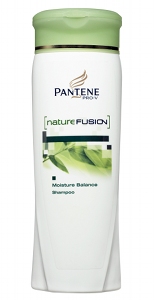
Spanish dominant Latinos continue to buy name brand personal care products, according to a 2010 survey
Photos: Procter and Gamble
Looking for a brand loyal market segment? While many consumers are cutting back on costs and choosing less expensive products during the recession lower income Spanish dominant Latinos continue to buy name brand personal care products; more than English dominant Latinos, according to a recent Mintel survey conducted online in August 2010 among 534 U.S. Hispanic respondents aged 18 and older.
Although many of the survey respondents had a lower-than-average household income level, they indexed higher than non-Hispanics in the consumption of personal care products in 2009. According to Mintel, over the last six years, Hispanics have consistently spent more on personal care products; although the researchers expect to find a less than 1 percent drop for 2010. Hispanics who responded to the survey index higher than non-Hispanics in the purchase of haircare products and bath products.
“Spanish-dominant Hispanics are most likely to stick to their favorite brand of hand soap, body soap and shower gel, signifying that less acculturated Hispanics remain loyal to the same brand despite the economy,” said Leylha Ahuile, senior multicultural analyst at Mintel, a research company. “English-dominant Hispanics tend to have higher household incomes and apparently are less concerned with brand name soaps and more focused on saving money.

Many of the Latino survey respondents said they favor multifunctional products
In spite of Hispanics’ lower-than-average household income level, they indexed higher than non-Hispanics in the consumption of personal care products in 2009. Over the last six years, Hispanics have consistently increased their spending on personal care products. And within personal care, Hispanics index higher than non-Hispanics in the subcategories of haircare products and bath products.”
Among the those surveyed by Mintel 64 percent of Hispanics who said they have an income between $25,000 and $49,999 said they still buy name brand body soaps or shower gels compared to 58 percent of English-dominant Hispanics who said they continue to buy name brand body soaps or shower gels even during the economic downturn.
Although they could switch to more affordable products Spanish-dominant consumers who responded to the survey said they are also more likely to stick to their favorite name brand lotions (51 percent versus 35 percent of English-dominant consumers), facial cleansers (27 percent versus 20 percent of English-dominant consumers) and toothpaste or mouthwash (69 percent versus 65% percent of English-dominant consumers).
Many of the lower-income Hispanics who participated in the survey indicated they are interested in saving money with multifunctional products. For example, 65 percent of those who earn between $25,000 and $49,999 said they are interested in two-in-one shampoo/conditioner, and 83 percent said they would be more inclined to purchase toothpaste that can also serve as a mouthwash and whitener.


























